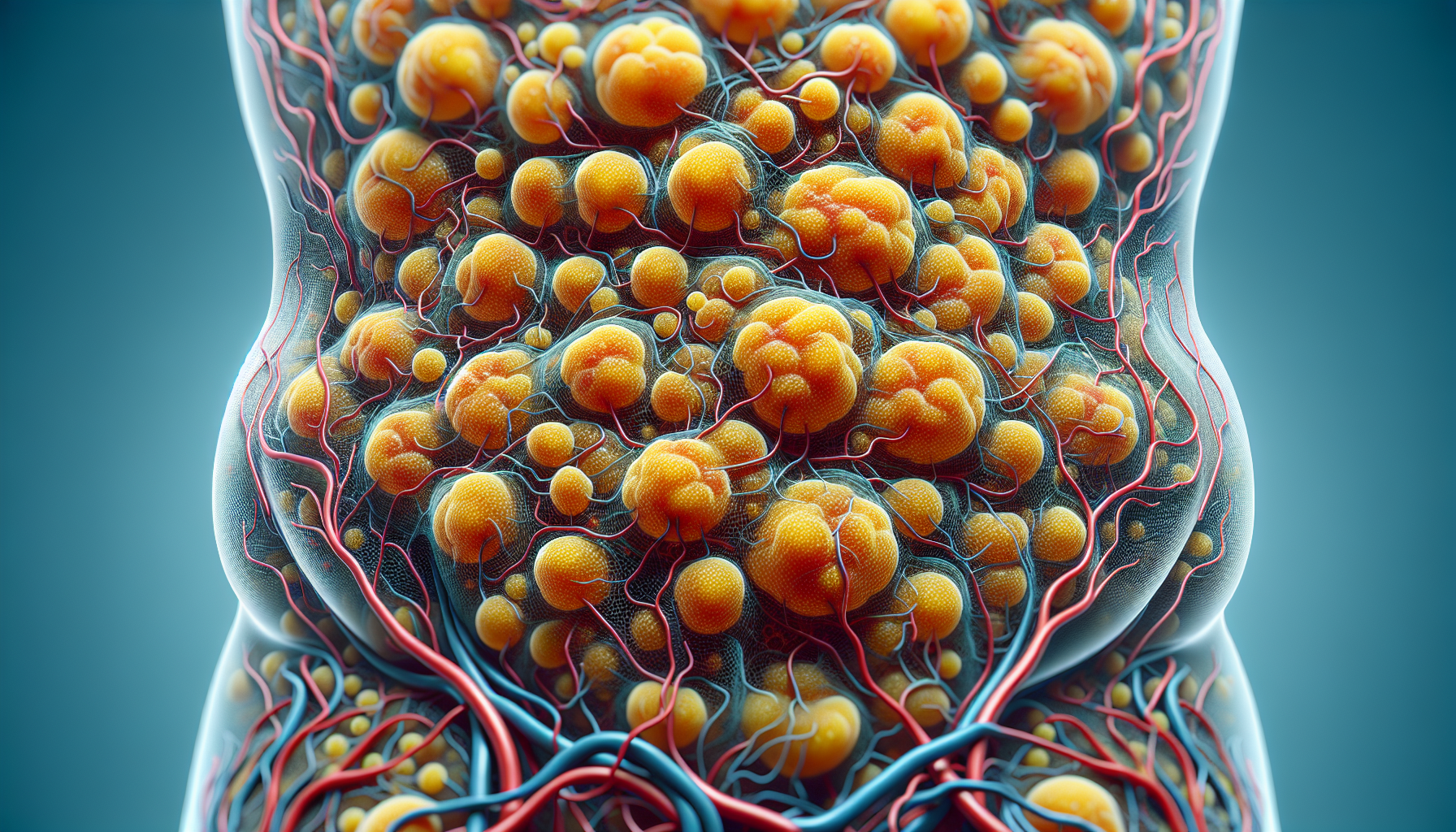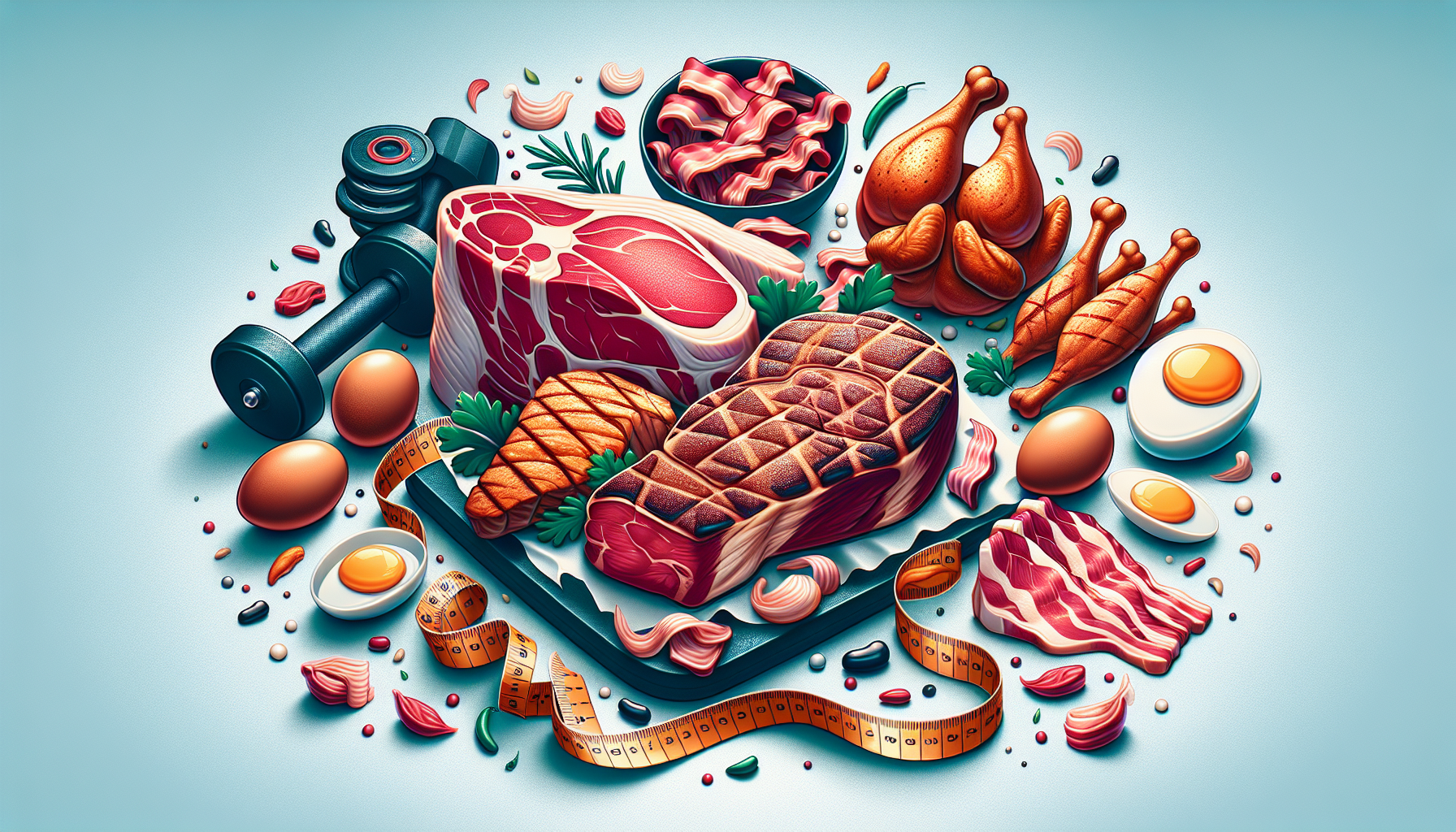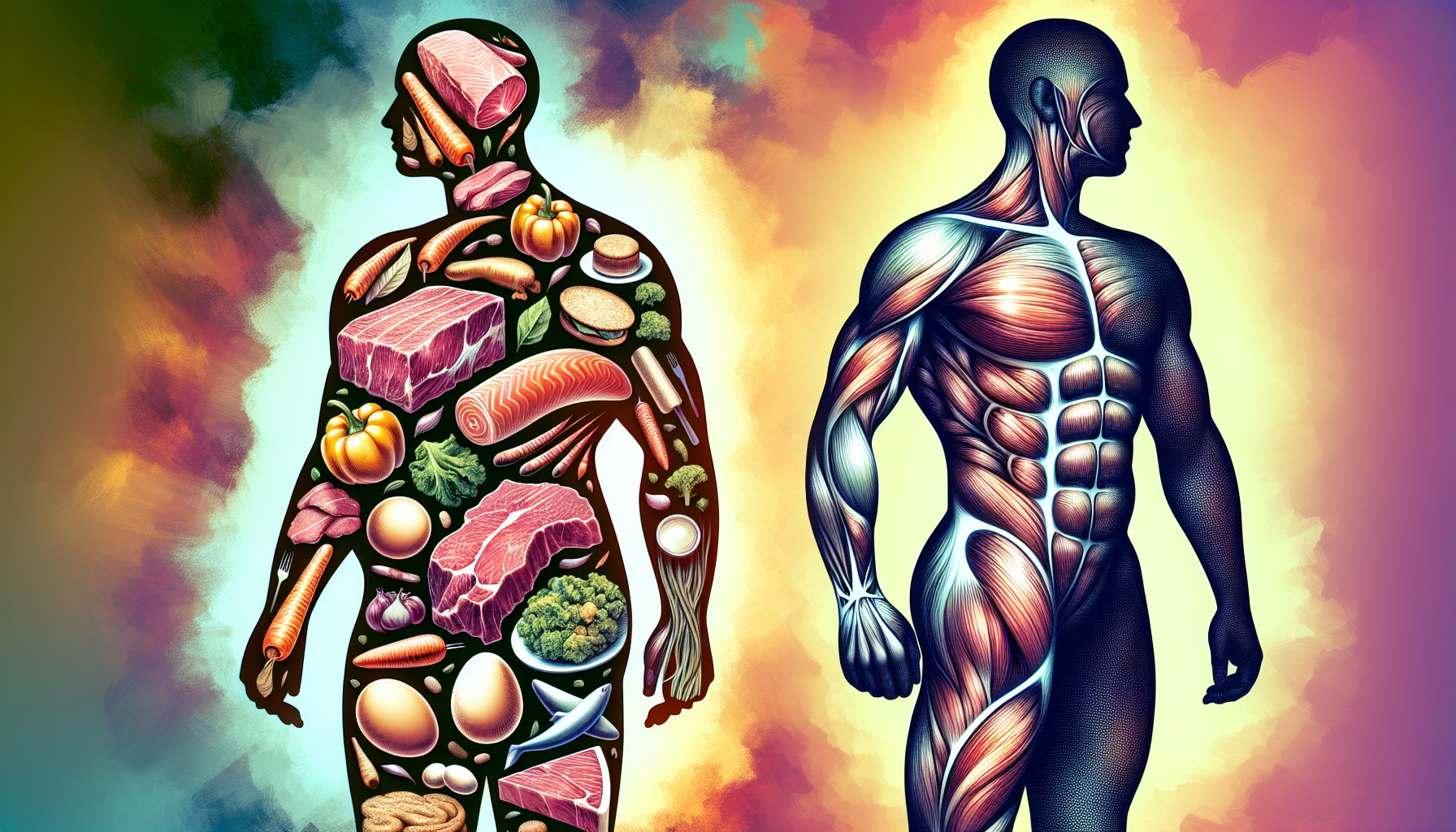Does Carnivore Diet Reduce Belly Fat? Analyzing its Impact on Weight Loss

Wondering if the carnivore diet can help you lose that stubborn belly fat? This article dives into the heart of the question: does carnivore diet reduce belly fat? Without the fluff, we’ll look at scientific evidence and real-world experiences to determine if a diet solely based on animal products make a difference in reducing belly fat. Keep reading to discover the potential of this meat-heavy diet as your ally in battling the bulge in your weight loss journey.
Key Takeaways
- The carnivore diet is believed to target belly fat by eliminating plant-based foods and carbs, focusing on animal products, potentially leading to weight loss, improved blood sugar control, and reduced inflammation.
- While some carnivore diet adherents report significant weight loss and improved body composition, nutrition experts warn about potential health risks, including nutritional deficiencies and increased heart disease risk from a high intake of saturated fats and cholesterol.
- It’s critical to approach the carnivore diet with caution, considering potential common pitfalls like excessive caloric intake and lack of nutritional balance; combining the diet with intermittent fasting, resistance training, and stress reduction may optimize fat loss.
Understanding Belly Fat and Its Challenges

Belly fat, often the bane of many a weight loss journey, is not just an aesthetic concern. This ‘active fat’ releases hormones that can impact our health and complicate our weight loss efforts. What makes the shedding of belly fat, a type of body fat, such a challenge? One of the biggest culprits is our diet. High consumption of sugary, fatty, and carbohydrate-rich foods contributes significantly to the accumulation of belly fat.
But it’s not just about what’s on your plate. Genetics too plays a role. Some of us are genetically predisposed to carry more fat around the midsection, making this area particularly stubborn to slim down. What can we do to combat genetic predispositions and unhealthy eating habits? This is where the carnivore diet comes into play.
The Carnivore Diet Explained Briefly
The carnivore diet eliminates carbohydrates by taking a page from our ancestral eating habits, focusing solely on animal products for nourishment. This means your plate on a carnivore diet is filled with:
- meat
- organ meats
- poultry
- seafood
- eggs
These are the diet’s cornerstone. And if you’re worried about monotony, worry not. The carnivore diet allows for a bit of variety. Cheese and other dairy products are permitted in moderation, adding a hint of diversity to the otherwise meat-centric diet.
You might wonder how such a seemingly restrictive diet aids in reducing belly fat. Let’s explore this further.
Targeting Belly Fat with the Carnivore Diet

The carnivore diet targets belly fat by eliminating plant-based foods and focusing on animal-based products. This approach claims benefits such as weight loss, improved blood sugar control, and reduced inflammation. But does it really work? Success stories and recommendations suggest the carnivore diet can be effective for weight loss, with commitment of at least 30 to 90 days to demonstrate its effects.
Individuals on this diet have reported a range of weight loss achievements, with some losing up to 15.4 pounds in 30 days. In studies, 93% of participants reported weight loss, signifying the diet’s potential in reducing belly fat. Next, we will examine how the body burns fat when on a carnivore diet and investigate the part hormones play in fat reduction.
How the Body Burns Fat on Carnivore
The carnivore diet is essentially a type of ketogenic diet due to its low-carbohydrate, high-fat approach. By consuming primarily animal-based foods, the carnivore diet naturally restricts carbohydrates and emphasizes fat and protein. This shift in macronutrient intake leads the body to enter a metabolic state called ketosis, where it burns stored fat for energy.
Ketosis is a powerful tool for weight loss. When in ketosis, the body uses fat as its primary energy source, leading to increased fat oxidation. However, hormones also play a pivotal role in fat reduction, which we will discuss further.
The Role of Hormones in Fat Reduction
Our hormones play a crucial role in how our bodies store and metabolize fat. Insulin, for instance, is a hormone that can be affected by our dietary habits. Elevated levels of another hormone, cortisol, which can result from stress, are linked to weight gain. High cortisol levels can hinder weight loss efforts by influencing fat distribution and metabolism.
Managing stress is thus important for regulating cortisol levels. By effectively managing stress, we can play a part in reducing belly fat and improving overall body composition.
What influence do the animal foods consumed in the carnivore diet have on our body composition?
The Impact of Animal Foods on Body Composition

Animal foods in the carnivore diet are more than just fuel. They provide essential nutrients and protein that are crucial for maintaining lean muscle mass and promoting fat loss. For instance, iron, which is essential for oxygen transport and energy metabolism, is abundantly found in animal-based foods such as liver and red meat. This can positively impact athletic performance.
However, the role of protein intake and fat as an energy source is central to understanding the impact of animal foods on body composition. Let’s delve into these aspects.
Protein Intake and Satiety
High protein intake from animal sources, or eating meat, plays a key role in the carnivore diet. Protein leads to greater satiety compared to carbohydrates or fats, potentially leading to a reduction in energy consumption over time. It’s even linked to significant reductions in cravings and desire for late-night snacking.
Further, the thermic effect of protein causes the body to expend more energy digesting and metabolizing it. This can result in about 20-30% of protein calories being used during digestion, increasing daily calorie burn by 80-100 calories or more. How does fat integrate into the carnivore diet?
Fat as a Source of Energy
On a low-carbohydrate diet like the carnivore diet, the body adapts to using fat stores as a primary energy source. This adaptation might contribute to fat loss. The process involves a transition where the body uses fat stores and dietary fat to produce ketone bodies for energy, which is a key aspect of the keto diet. A low carb diet, such as the carnivore diet, can be an effective way to achieve these results.
This metabolic state, known as fat adaptation, is achieved on a ketogenic diet where the body more efficiently uses fat as its primary source of energy. But how does this theory hold up in real life? Let’s look at some carnivore diet success stories.
Real Results: Carnivore Diet Success Stories
Before and after images of individuals on the carnivore diet paint a compelling picture of its potential. They show significant weight loss and improvements in body composition, including a noticeable reduction in belly fat. However, keep in mind, switching to a carnivore diet can involve an adjustment period, which might include temporary digestive changes.
Despite this, many have found the diet’s benefits to outweigh the initial discomfort. Yet, success on this diet isn’t just about what you eat. Let’s examine some common pitfalls in the quest for belly fat loss.
Common Missteps in Pursuing Belly Fat Loss
While the carnivore diet can be a potent tool in your weight loss arsenal, several factors can hinder your progress. One common misstep is believing that counting calories isn’t necessary on the carnivore diet. However, tracking intake and maintaining a caloric deficit are crucial for weight loss.
Lifestyle factors can also impact your weight loss journey, including the process of losing weight. Some common pitfalls to be aware of include:
- A sedentary lifestyle
- Insufficient sleep
- Inadequate water intake
- Psychological stress
These factors can all hinder your weight loss efforts. Let’s delve further into each of these pitfalls, beginning with excessive caloric intake.
Excessive Caloric Intake
While the carnivore diet emphasizes the consumption of animal products, maintaining a caloric deficit is crucial for weight loss. This means that you must burn more calories than you consume. Achieving weight loss on the carnivore diet can be managed by maintaining a daily caloric deficit of 100-200 calories for a gradual reduction, or 500 calories for a more aggressive approach.
But while focusing on calories, it’s also important not to neglect nutritional balance.
Neglecting Nutritional Balance
Neglecting nutritional balance on the carnivore diet may lead to health concerns. A strict carnivore diet may cause a lack of dietary fiber, which can result in poor gut health. Additionally, by excluding fruits and vegetables, individuals on the carnivore diet may not get enough essential nutrients like carotenoids and polyphenols, which are crucial in reducing the risk of chronic diseases.
These potential issues highlight the importance of considering all aspects of your health when embarking on a new diet. So, how can we optimize the carnivore diet for maximum fat loss?
Enhancing the Carnivore Diet for Optimal Fat Loss

While the carnivore diet can be effective on its own, incorporating certain strategies can enhance its effectiveness. Integrating intermittent fasting, for instance, can help manage hunger and promote fat loss due to the nutrient density of animal foods.
Alongside dietary changes, incorporating physical activities such as:
- brisk walking
- cycling
- swimming
- yoga
Implementing stress reduction techniques like meditation or yoga can not only help you lose weight but also enhance fat loss. These practices can aid in weight loss by reducing stress levels.
Let’s delve into these strategies with more depth.
Incorporating Intermittent Fasting
Intermittent fasting is a powerful tool that can enhance the benefits of the carnivore diet. When combined with the carnivore diet, intermittent fasting can enhance hormone regulation and stimulate natural appetite control, leading to potentially greater weight loss outcomes.
If you’re new to intermittent fasting, it’s advisable to first adopt the carnivore diet to ensure the consumption of nutrient-dense foods. This can help your body naturally adjust to fasting. But diet and fasting are just one part of the equation. Let’s examine the importance of resistance training.
Adding Resistance Training

Resistance training can be a game-changer for those on the carnivore diet. Maintaining a high protein intake during weight loss can help prevent muscle loss and metabolic slowdown. The high protein content of the carnivore diet aids in muscle repair and growth, which is essential for rebuilding muscle fibers after exercise.
Some benefits of resistance training on the carnivore diet include:
- Increased muscle strength and endurance
- Improved body composition
- Increased bone density
- Enhanced metabolism
- Improved insulin sensitivity
Incorporating resistance training into your carnivore diet can help you achieve your fitness goals and optimize your overall health.
By building lean muscle through resistance training, you can raise your metabolism. When combined with the carnivore diet, this can contribute significantly to weight loss as it increases calorie expenditure. What about the potential health concerns and risks tied to the carnivore diet?
Addressing Health Concerns and Risks
While the carnivore diet has potential benefits, it’s important to be aware of its potential health concerns and risks. A strict carnivore diet may lead to nutritional deficiencies and higher risks of diseases associated with increased saturated fat and cholesterol intake.
Long-term adherence to a carnivore diet could potentially result in detrimental health outcomes, such as heart disease and colon cancer. Further, research on the carnivore diet is limited, and its purported sustained health benefits are primarily supported by anecdotal evidence.
Additionally, the carnivore diet’s focus on exclusively animal products raises concerns about its environmental impact and long-term sustainable food practices.
Comparing Carnivore to Other Diets for Belly Fat Reduction
One might be curious about how the carnivore diet fares against other diets in terms of belly fat reduction. Just like the ketogenic diet, the carnivore diet aims to induce ketosis. But instead of limiting carbs, the carnivore diet completely eliminates plant-based foods and carbs.
This restriction can lead to short-term weight loss. Plus, the focus on meat and animal products simplifies dietary choices, which can be beneficial for those struggling with decision fatigue from other diets. Interestingly, research has shown that reducing meat and/or dairy consumption does not significantly affect body weight or body composition.
Navigating a New Diet: Tips for Beginners
Like any new diet, adapting to the carnivore diet can be a challenge. Before starting, it’s advisable to consult with a healthcare professional for personalized advice and to ensure safety. To ease into the diet, consider removing non-carnivore foods from your pantry and fridge, thus minimizing temptations.
A slower transition to the carnivore diet can make the change more manageable. Here’s a suggested approach:
- Start by eliminating processed foods from your diet.
- Then, gradually reduce your intake of carbohydrates and plant foods.
- Finally, commit to follow the carnivore diet strictly for at least 30 to 90 days to observe its benefits.
Remember, consistency is key in making any dietary change. Stick to the plan and give your body time to adjust.
Summary
The carnivore diet, focusing on animal foods, has shown potential in reducing belly fat. While it might seem restrictive, the diet’s simplicity can be an advantage. However, it’s crucial to consider the potential health concerns and risks. Balancing the diet with intermittent fasting and resistance training can enhance its effectiveness. As with any diet, success lies in consistency, patience, and taking a holistic approach to health. Whether you’re new to dieting or a seasoned veteran, the carnivore diet offers a unique approach to weight loss that may be worth exploring.
Frequently Asked Questions
What is the carnivore diet?
The carnivore diet is a strict regimen that relies only on animal products for nourishment while excluding carbohydrates completely.
How does the carnivore diet target belly fat?
The carnivore diet targets belly fat by eliminating plant-based foods and focusing on animal-based products, which can help reduce overall body fat.
How does the body burn fat on the carnivore diet?
On the carnivore diet, the body burns fat by entering ketosis, a metabolic state where it uses stored fat for energy.
Can I consume dairy products on the carnivore diet?
Yes, you can consume dairy products like cheese in moderation on the carnivore diet. Dairy products are permitted within limits.
What are the potential health risks of the carnivore diet?
The potential health risks of the carnivore diet include nutrient deficiencies, heart disease, and concerns about long-term sustainability. It's essential to consider these factors before adopting this eating plan.
